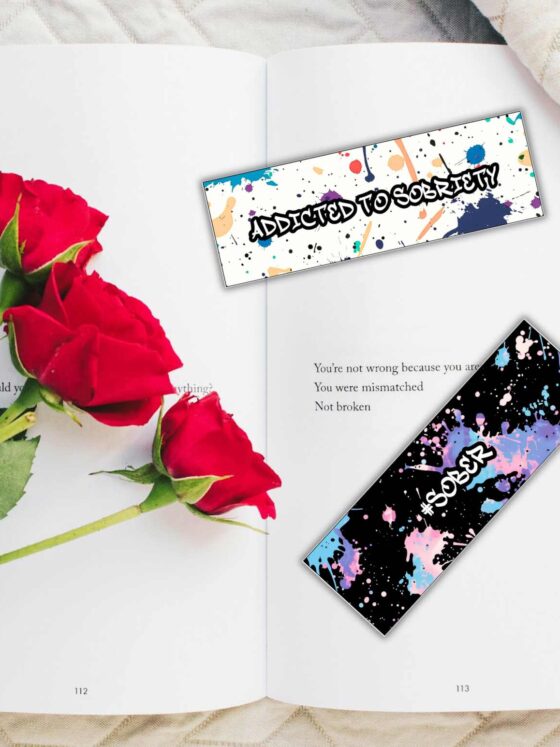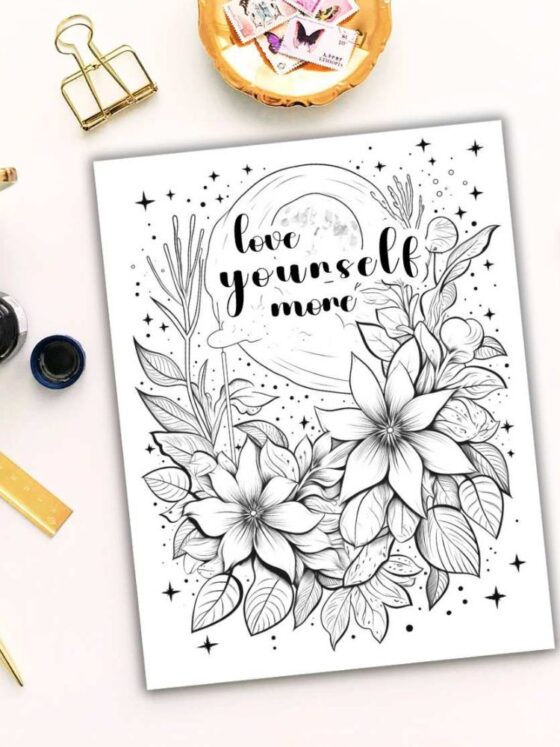As a mental health worker, I see a variety of mental health illnesses every day; all of which are fascinating yet complicated at the same time.
Below is an interview I conducted with someone who is diagnosed with Bipolar Disorder.
The purpose of this interview series is to act as a resource; a place where one may find comfort in knowing they are not alone and to broaden the knowledge and share lived experiences of Bipolar Disorder.
- Interviewee: Anonymous
- Gender: Female
- Age: 67
Pause here and save this pin for later!

Disclosure: This post may contain affiliate links. If you click and purchase, I may receive a small commission, at no extra cost to you. Learn more here
Intimate Interviews: Bipolar Disorder
What does bipolar disorder mean to you?
“Bipolar disorder can be described as having symptoms, such as extreme emotions, visual and auditory hallucinations and delusions.”
“It means pain. The depressions are unbearable and the highs are just…they just wreck your whole life. You go and spend all your money.”
“As a child and youth, I was detached and alone – very alone. It just hurt so hard. You couldn’t share anything with anybody because you might say something wrong. I learned to live my own life inside myself.”
When did you first realize you were experiencing BD?
“At 28, it developed all at once. All of a sudden, I started hearing voices at work, sitting at my desk. And the voices were superior to me. Sometimes helpful, sometimes horrible – what they did to me…Do not smoke. Do not smoke. Do not smoke.”
“I went through 10 years of hell, trying to get straight because the meds in 1980’s weren’t good. I’ve always been medication compliant.”
“I had the most wonderful psychiatrist; second to my mom to people I have loved, except for my children.”
“The psychiatrist meant everything to me. If they said I couldn’t go to her, I would have killed myself.”
How did you find your psychiastrist?
“I went into the emergency ward and sat in the intake room and announced I had a brain tumor talking to me after about 1 year of struggling with it by myself. I tried everything. I kept trying to find out what it was. That’s all I cared about. I wanted to find out what was going on with me.”
“I could tell something was wrong. One day I was completely mirroring some guy’s movements, he thought I was coming onto him.”
How did it affect your day to day life?
“The bipolar took all my energies to deal with it at first. After I had learned enough and understood how to deal with my medication better and had better meds. Once I learned coping techniques that helped my day to day and I was able to go to university and work alright.”
“I became incapable of coping or keeping house. When depressed, your personal hygiene goes way down.”
“I had two children, at 20 and 24, so I had to look after them. I asked for family help too at first and I stayed with them. There were four brothers and sisters living at home even though I was that old because everybody was taking university or working.”
“So I did live at home for a while but I got out as soon as I could because my father molested my daughter as he had me when I was young.”
Did you feel that the molestation contributed to your illness?
“No, the bipolar was genetic and came at 28. Then for 10-15 years, I studied coping techniques and other materials to cope with it – CBT (cognitive behavioural therapy) and DBT (dialectic behavioural therapy).”
“As soon as the bipolar illness had become more manageable, I developed strong PTSD symptoms.”
How did it affect your relationships with loved ones?
“I became vulnerable as my family tried to cope with me and the illness.”
How did it affect your work life?
“I have always worked even when psychotic. I’ve been fired from jobs strictly from being ill.”
“I worked for the RCMP in the 1980’s for 5 years. One of the other members of the RCMP saw me in the psychiatric hospital as their mother was there as well. That immediately meant that my coworkers knew about my illness. It got out. I tried to keep it quiet. And then after, I was taken to the head office, my keys were taken from me, they had me bring all my belongings. This was just in the middle of the day, they had me turn over my keys infront of everybody then took me to the big boss’s office, where I was informed: I was off for 2 weeks and had to produce 2 psychiatric signatures to say I wouldn’t be violent. I succeeded in doing that but could no longer work in that environment.”
What are your thoughts on stigmatization of bipolar disorder?
“Stigma runs rampant in someone’s life to a far greater degree than people understand. Movies such as ‘Psycho’ disfigure the reality of mental illness to a vast degree. The whole concept of mental illness is so incomprehensible to some people and the general rules of prejudice apply.”
How do you feel stigmatization has changed over the years?
“Since 1981, the treatment and development of psychological coping techniques has changed the landscape tremendously. The information is more accessible and people are more open to looking at it as an illness as opposed to a character flaw because we were looked at as having character flaws.”
“The media, the parents, there was just no information out there, people would never admit they have an illness. And it would be hidden in attics, basements and institutions far overreaching what was necessary. Now, there’s far more willingness to understand the reality of these things in society.”
How accessible were support and services in society for you?
“In 1980’s, massive dosages of Haldol, Chlorpromazine and Stelazine were all highly offensive to the physical well–being of a human being.”
“Antipsychotic meds that had horrible side effects; audio and visual hallucinations, all the symptoms that come with being bipolar and where you are in attempt to work with it.”
“Medication, locked in the hospital or institution, very few services – in a small town, none.”
What are your views on medical treatment of Bipolar Disorder?
“Massively better than what they used to be in 1980’s. They found that all medical companies were lying about their stats on their medications and doctors were blaming patients for noncompliance. They were saying the medications were better than they were and the patients were having trouble, so they were blaming them.”
“Medication was considered the 3rd wave of psychiatry in the 1970’s and onward. The first wave was Sigmund Freud, who introduced mental illness as an illness. There has been a great deal of change since those times.”
What do you do to cope with Bipolar Disorder?
“Get yourself a doctor; a psychiatrist. Take your pills and be willing to try new things.”
“I discuss it with people, other people with the illness and friends and family to help cope when things are difficult. Be sure to know the difference between active or in remission, like we never talk about curing the illness, we just learn ways to cope with it.”
“I have studied coping techniques. I read a lot. I read by the decade and learned more as the coping techniques developed over time.”
“Taking CBT (cognitive-behavioural therapy) courses, taking DBT (dialectical behaviour therapy) courses, all of these things are learning to cope with bipolar illness. A lot of studying is the best thing you can do to help yourself work with the illness.”
“Reality testing is extremely helpful if you can develop your mind in that fashion. I made psychic arrangements to meet for a coffee with a man, it wasn’t men or women, it didn’t matter and they never showed up. That’s really eye opening, when you think in your mind that you’re supposed to be meeting with someone and they never show up, then you know that there’s something wrong with you.”
What do you do when you cannot cope?
“Hospital. Get help because you could be headed for a dangerous incident and getting help is often the only way to deal with it. I consider the suicide rate to be the death rate of mental illness and it’s surprisingly high.”
What methods or techniques do you have to overcome it?
“Learn about your illness, study it, in books, textbooks and with other people. I found these to be some of the most important things to do when you first experience the illness.”
“Getting help, getting to the right doctor is mandatory in dealing with an illness. I was having delusions, auditory and visual hallucinations and was trying to make some sense out of the world when it had changed so much. There was no way I could do it on my own, though I had a lot to contribute as does everybody if they put their mind to it.”
“It’s very hard to admit to anyone you have a mental illness, most specifically at job interviews. You don’t want anybody to know.”
What advice do you have for someone who also has Bipolar Disorder?
“Study and listen to your psychiatrist, after once you have ascertained he’s a good doctor.”
Thanks for stopping by 

Like this post? Save this pin!











